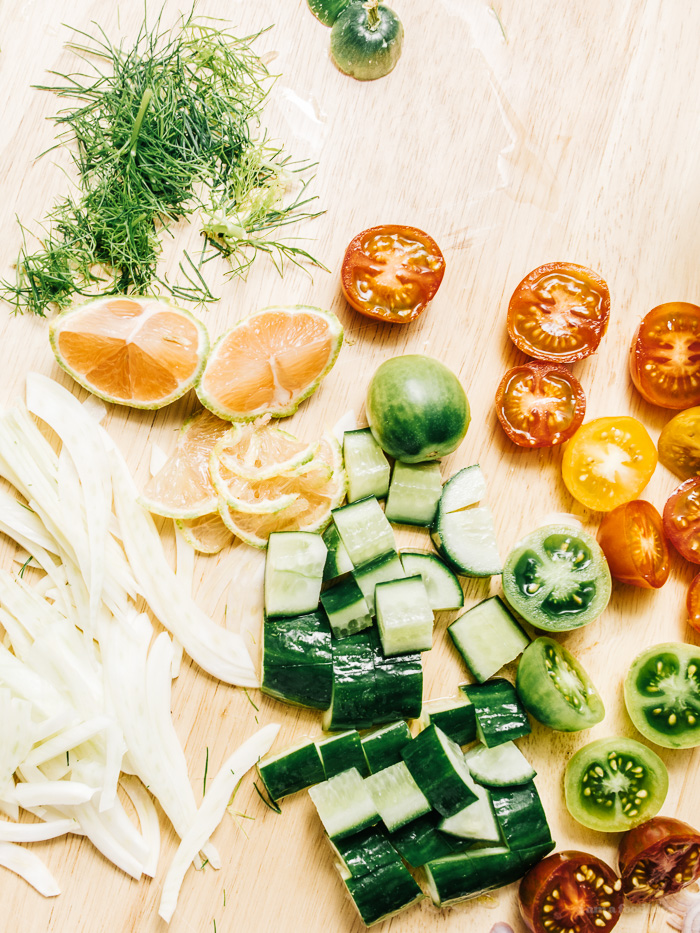
Give me all the noodles, even in the summer. I don’t mind sweating over a bowl of ramen or pho, especially if it’s homemade. But, if you’re not up for the noodle sweats, don’t worry, I’ve got your back with this summery noodle salad full of all the good stuff.
Are you guys a fan of mung bean noodles? They are one of my faves – I mean, if I absolutely had to choose a favorite noodle, well, to be honest, I really wouldn’t be able to because true noodle folk don’t make other noodle folk choose between their babies. Mung bean noodles are slippery, chewy, and, made of mung beans. They kinda went around for a while with a claim that they were healthier than other noodles, but aside from being naturally gluten free, they are pretty much like all the other dried noodles out there, except they’re made from beans, not flour or rice.

I love noodles cold and they’re perfect in this salad, which is full of what I think of as summer: flaky ruby red salmon, impossibly sweet tomatoes, cucumbers, and crunchy fennel. I can, and have lived off variations of this all summer long. Hope you give it a try!
Noodle salads and summer five-ever,
xoxo steph
Summery Salmon Cold Noodle Salad Recipe
serves 2
- 1 bundle mung bean threads*
- oil
- salt and freshly ground pepper
- 1 small filet of salmon
- 2 Persian cucumbers, cubed
- 1 small shallot, thinly sliced
- 1/2 bulb fennel, thinly sliced, fronds reserved
- 1/2 cup peas*
- 1/2 pint cherry tomatoes, halved
- 2 tablespoons rice vinegar
- 2 tablespoons neutral oil
- 2 teaspoons toasted sesame oil
- squeeze of lemon
- salt and freshly ground pepper
Prepare the mung bean noodles according to the package. Drain and soak in cold water while preparing the remaining ingredients.
Season both sides of the salmon with salt and pepper. Heat up a touch of oil over medium-high heat in a non-stick frying pan. Cook, flipping once, until salmon flakes easily and is cooked through, about 2-3 minutes per side, depending on thickness of filet. Remove from the heat and let cool.
In a small bowl, whisk together the rice vinegar, oil, sesame oil and a squeeze of lemon. Taste and season with salt and pepper. Set aside.
Drain the noodles well and place in a large bowl. Flake the salmon in to the bowl and add the cucumbers, sahllot, fennel slices, peas and cherry tomatoes. Give the vinaigrette a quick whisk and then add to the salad, to taste. I usually just add all of the dressing – the noodles soak up quite a bit of it while it’s sitting. I like my salad cold, so I make this ahead of time and then eat cold, but you can enjoy it at room temperature as well.
Note: You can find mung bean threads in the noodle aisle in your local grocery store. Sometimes well stocked grocery stores might have them in the Asian aisle. They’re also known as glass noodles, cellophane noodles, bean thread, or vermicelli. Don’t confuse them with rice vermicelli though: make sure you take a look at the ingredient list. Most will list green mung bean and water (these are the kind that I buy, wrapped individually and then in a hot pink net bag) but some also have green bean or peas.
I used fresh peas that a sautéed quickly, feel free to use frozen.





Love love love cold noodle bowls! What font did you use to write over your main image – the paintbrush calligraphy? Love it!
thanks jessica! i hand calligraphed it :)
mung bean noodles are the best! also ha “noodle sweats” <– truth.